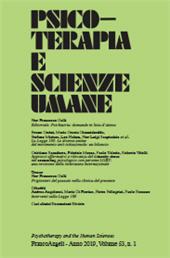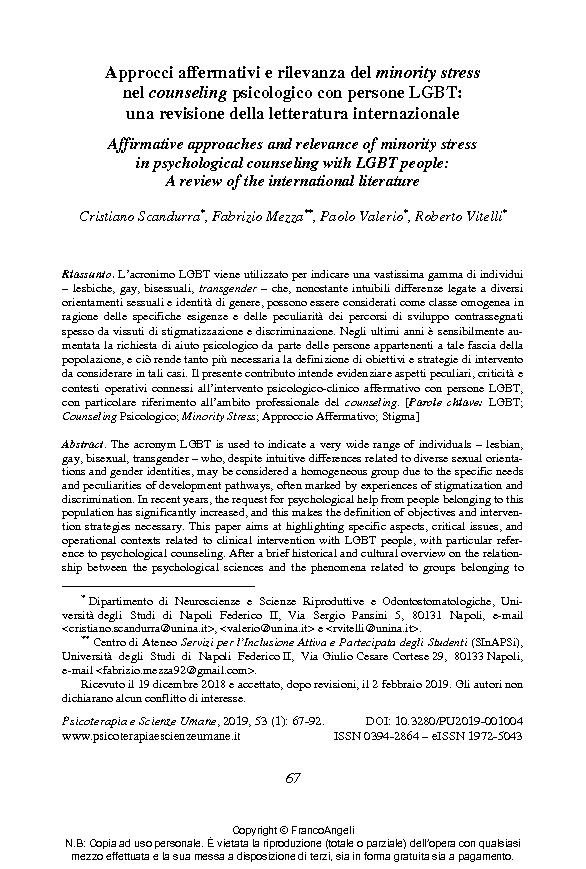Approcci affermativi e rilevanza del minority stress nel counseling psicologico con persone LGBT : una revisione della letteratura internazionale
67-92 p.
L'acronimo LGBT viene utilizzato per indicare una vastissima gamma di individui - lesbiche, gay, bisessuali, transgender - che, nonostante intuibili differenze legate a diversi orientamenti sessuali e identità di genere, possono essere considerati come classe omogenea in ragione delle specifiche esigenze e delle peculiarità dei percorsi di sviluppo contrassegnati spesso da vissuti di stigmatizzazione e discriminazione. Negli ultimi anni è sensibilmente aumentata la richiesta di aiuto psicologico da parte delle persone appartenenti a tale fascia della popolazione, e ciò rende tanto più necessaria la definizione di obiettivi e strategie di intervento da considerare in tali casi. Il presente contributo intende evidenziare aspetti peculiari, criticità e contesti operativi connessi all'intervento psicologico-clinico affermativo con persone LGBT, con particolare riferimento all'ambito professionale del counseling. [Testo dell'editore].
The acronym LGBT is used to indicate a very wide range of individuals - lesbian, gay, bisexual, transgender - who, despite intuitive differences related to diverse sexual orientations and gender identities, may be considered a homogeneous group due to the specific needs and peculiarities of development pathways, often marked by experiences of stigmatization and discrimination. In recent years, the request for psychological help from people belonging to this population has significantly increased, and this makes the definition of objectives and intervention strategies necessary. This paper aims at highlighting specific aspects, critical issues, and operational contexts related to clinical intervention with LGBT people, with particular reference to psychological counseling. After a brief historical and cultural overview on the relationship between the psychological sciences and the phenomena related to groups belonging to sexual and gender minorities,
two of the most prevalent theoretical perspectives in the scientific and professional system on LGBT issues are described: the minority stress theory (a perspective used in scientific research as a key to understanding the high levels of stress usually encountered in such a population) and the affirmative paradigm (a perspective currently privileged in clinical practice with LGBT clients). Thus, the contribution is focused on the development of the LGBT dimensions within the counseling context, retracing various historical stages that led the Association for Lesbian, Gay, Bisexual, and Transgender Issues in Counseling (ALGBTIC) to propose a set of guidelines which are briefly discussed, as they represent a fundamental tool for professionals involved in helping relationships. In conclusion, the current research perspectives highlighting an unsatisfactory scenario regarding the empirical evidence on the effectiveness of counseling interventions addressed to LGBT clients are discussed. [Publisher's text].
Fa parte di
Psicoterapia e scienze umane : LIII, 1, 2019-
Articoli dello stesso fascicolo (disponibili singolarmente)
-
Informazioni
Codice DOI: 10.3280/PU2019-001004
ISSN: 1972-5043
PAROLE CHIAVE
- LGBT, Counseling Psicologico, Minority Stress, Approccio Affermativo, Stigma
- LGBT people, Psychological and clinical interventions, Psychological counseling, Minority stress, Affirmative interventions



